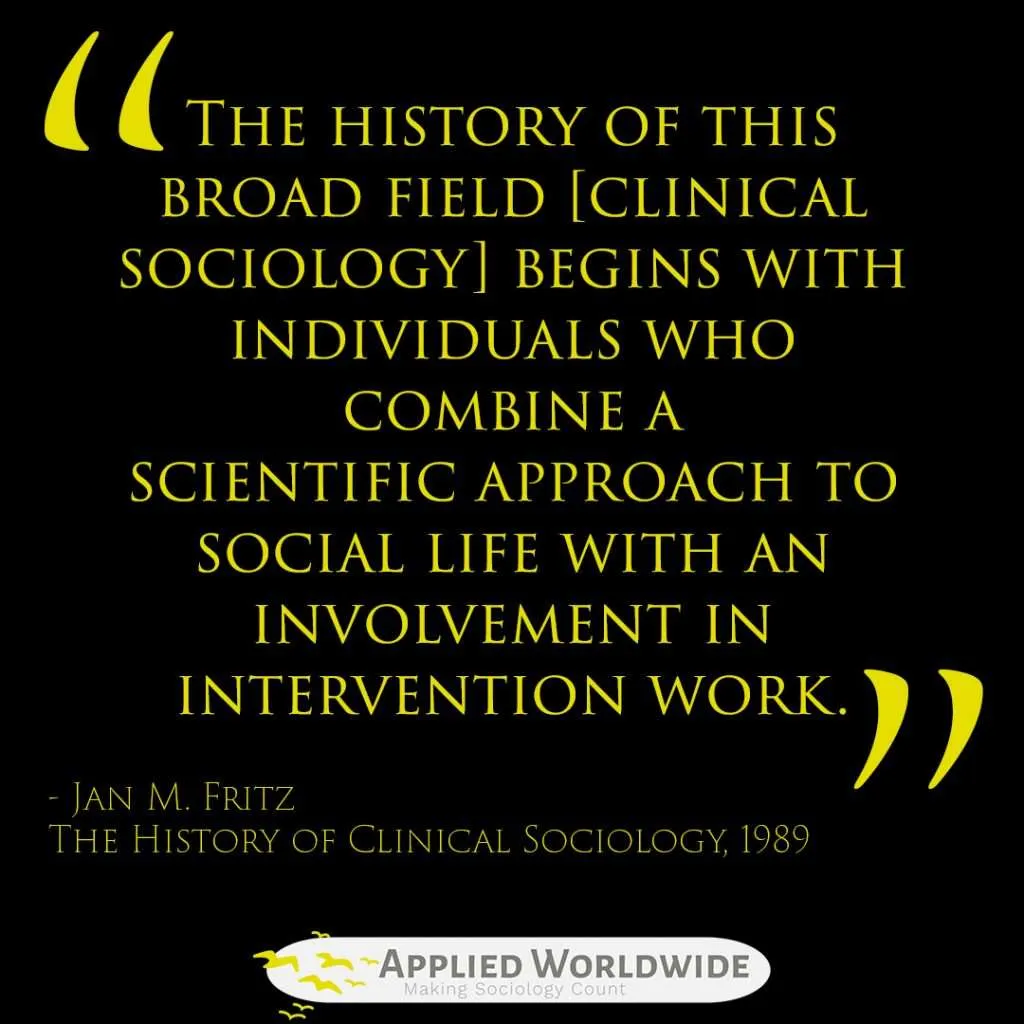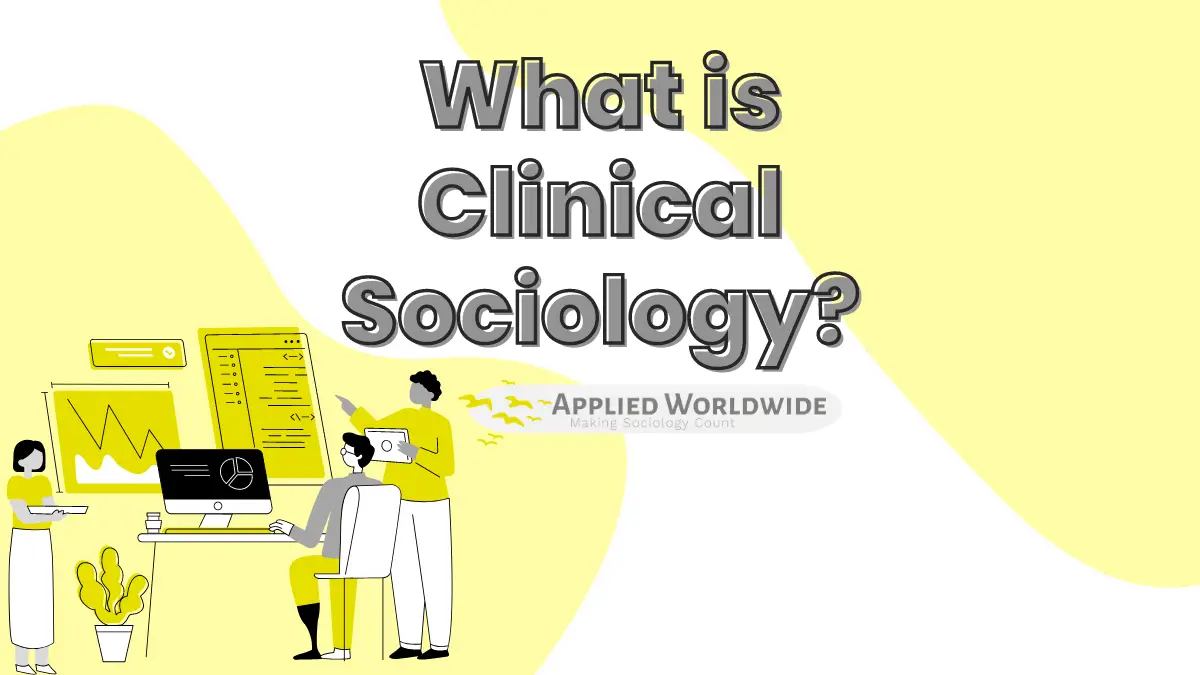Clinical Sociology is the use of sociological theories, methods, and other skills to design, implement, and evaluate interventions that improve outcomes and solve organizational challenges.

Applied Sociology vs Clinical Sociology
Clinical sociology and applied sociology, while similar and not necessarily mutually exclusive, are different. In order to differentiate between applied sociology and clinical sociology, I want to introduce a third type of sociology; pure sociology. Pure sociology is the use of research methods and theory to produce knowledge within the field. The typical outcomes of pure sociology are peer-reviewed scientific journal articles and presentations at annual meetings for professional organizations, such as the American Sociological Association.
In comparison, applied sociology is the use of sociological skills and knowledge to improve the well-being of society. Applied sociology encompasses a wide variety of work including public sociology, community-engaged sociology, and clinical sociology. Therefore, applied sociology is an umbrella term that includes clinical sociology as well as other applications.
As previously mentioned, clinical sociology is the use of sociological theories, methods, and other skills to design, implement, and evaluate interventions that improve outcomes and solve organizational challenges. So, clinical sociology is a type of applied sociology that involves the specific aim of improving outcomes for organizations.
Explaining Clinical Sociology
Understanding clinical sociology can be challenging. Often, when I am questioned about clinical sociology I use a comparison to social work. If a person needs access to resources that will help improve their lives, they can seek or be united with a social worker. A clinical sociologist is like a social worker for organizations. When an organization needs an intervention in order to improve its outcomes, clinical sociology offers the skills and knowledge to provide solutions.
Examples of Clinical Sociology
At Applied Worldwide, we have had the pleasure of working with the Association for Applied and Clinical Sociology to highlight the organization’s members and the work they do as applied and clinical sociologists through a series of profile interviews.
Sara J Cumming, PhD: Improving Group Outcomes
One great example of clinical sociology in action comes from Dr. Sara J Cumming‘s profile. Dr. Cumming works with not-for-profit organizations trying to improve outcomes for marginalized groups and is also the Executive Director of the not-for-profit Home Suite Hope. In our interview with Dr. Cumming, she told us:
My interests as a clinical sociologist surround ameliorating hardships for marginalized populations. As a researcher, I work with communities to help them identify barriers to accessing services such as affordable housing, food security, social services and employment supports, and then provide tangible and implementable solutions.
Janet Mancini Billson, PhD: International Consulting
From the same series of profile series, we had the opportunity to interview Certified Clinical Sociologist (CCS) Dr. Janet Mancini Billson. In addition to her certification as a clinical sociologist, Dr. Billson also holds certification in group therapy and group facilitation from the Boston Institute for Psychotherapy. She uses her skills as a CCS to conduct evaluation research for both public and private sector clients, always working toward positive change for he organizations who hire her.
Gary David, PhD: Analytical Insights and Design Solutions
Dr. Gary David is also a CCS who uses his skillset to offer a myriad of services to clients including: experience design, experience alignment, user experience, customer experience, patient experience, diversity and inclusion training, ethnographic studies of work, and forensic linguistics. In our interview with him, Dr. David specified,
As a certified applied and clinical sociologist, I use a systems approach to generate analytical insights, design solutions, and create client value. As an instructor, consultant, and facilitator, I have worked with companies across sectors in achieving a contextually-based experience design strategy, developing community-based approaches to achieve distributed work, and identified opportunities for and barriers to organizational cultural change.
The three examples above show how clinical sociology covers a wide range of practices and goals. While all the clinical sociologists mentioned use sociology broadly to improve organizational practices and outcomes, the way they go about that work and the niche within which they perform that work differ.

How to Become a Clinical Sociologist
There are two important elements to identifying a fulfilling niche in which to practice clinical sociology. Many of the examples in our profiles include professionals who serendipitously found their careers, but students can train for specific careers if they plan accordingly. Self audit and second-domain analysis are the two most important professional development exercises a sociology student can carry out to work toward a specific clinical sociology career.
Conducting a Self-Audit
Whenever I can offer career advice to sociology students, I immediately suggest self-audit. Self-audit is an evaluation of your own skills and experiences. It is about nurturing your professional strengths and improving in other areas. Clinical sociologists have to market their skills and the first step is developing and nurturing skills that may be most valuable.
I first learned about self-audit in a series of graduate-level applied anthropology courses, aided by Sherylyn Briller’s book Designing an Anthropology Career: Professional Development Exercises. While the book is designed for anthropology students, the majority of the lessons are likely applicable across the social sciences. I highly encourage anyone to purchase Dr. Briller’s book. The exercises within have been something that I occasionally feel the need to revisit. Without replicating the book’s valuable content, I would like to share a bit more about sel- audit.
If you run a Google search for self-audit you will likely see content from the business world. For instance, the top search result comes from Chron suggesting,
“Writing a job self-audit report typically involves conducting self-examination activities on an annual basis to effectively manage your career. By identifying your strengths and weaknesses, you can compare yourself to the background and experiences of your peers.”
In other words, a self-audit is a regular check-in with yourself to assess your own skills and experiences and compare them against others whom you may be in competition with for career opportunities. As we inwardly reflect on our own skills and experiences, we can begin to learn how to best market our skills in our chosen professional domain.
Conducting a Second Domain Analysis
A second domain analysis is another professional development exercise that can assist us in developing careers in clinical sociology. While self audit requires us to look inward at our professional skills and experiences, a second domain analysis requires we evaluate the conditions of the employment market where we wish to work. A second domain, for example, might include an industry or sector. For instance, we have conducted second domain analyses of sociology jobs in the technology and healthcare industries.
In short, if we are getting a sociology degree, then sociology is our first domain. Our second domain, then, is the area we would like to apply our sociological skills and knowledge. If we plan to use sociology in healthcare, technology, education, government or any other area, we need a way of assessing those domains, which is where the second domain analysis comes in.
When conducting a second domain analysis, students should start with looking at job postings. Job postings tell us what kind of skills are valuable in the industry and we can use those opportunities to prepare for future jobs. We can also conduct informational interviews with professionals in our second domain. Informational interviews are those with professionals in a certain industry with a goal of learning more about the real-life experiences of working in said industry. Such interview can give us additional knowledge on the types of skills necessary, but they can also reveal problem areas.
Considering clinical sociology is about using skills and knowledge to improve organizations, learning about existing problems is valuable. If we can identify problems that organizations face in a domain of interest, we can shape our educational experiences around finding solutions.
Combining Self Audit and Second Domain Analysis
In order to forge your own fulfilling career in clinical sociology, students should use a combination of self audit and second domain analysis. Self audit can help establish strengths and weaknesses and allow us to assess what skills and knowledge we want to use as professionals. Understanding those experiences can help us identify the area in society in which to practice clinical sociology. Second domain analyses will allow students to hone the industry or sector in which they want to work, ensuring they are prepared and marketable.
Final Thoughts on Clinical Sociology
Clinical sociology is the use of sociological skills and knowledge to improve organizations. This type of sociology falls under the umbrella of applied sociology. As we have noted there are examples of clinical sociologists in both the non-profit and for-profit sectors and in a variety of industries. Even with these examples, it can be difficult to find the right path toward a fulfilling career in clinical sociology. We propose self audit and second domain analysis as two exercises that sociology students can use to prepare themselves for careers in clinical sociology.







